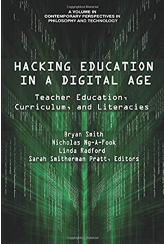Publication Details
| OLOR Series: | ROLE Reviews |
| Author(s): | Jarred Worley |
| Original Publication Date: | 15 March 2020 |
| Permalink: |
<gsole.org/olor/reviews/2020vol3no1.rev5> |
Publication Note
This review was originally published in Research in Online Literacy, vol. 3, no. 1 (2020).
Resource Overview
Media, Figures, Tables |
Resource Contents
Review of Hacking Education in a Digital Age
Education has arrived at a critical juncture. With the rise of neoliberal economic policies, a globalized work force, and an age of information defined by constant technological innovation, students, fed through easily measurable skills-acquisition focused curricula, have become units on a production line, models in a system that prizes obedience and in which jobs are scarce. It is not surprising then that educators are discussing ways of challenging such a system, staking a claim for their students in the territory of their classrooms, in a word, hacking the institution from the inside out. Hacking Education in a Digital Age: Teacher Education, Curriculum, and Literacies provides such a discussion, using hacking as its focus and its technique for revitalizing and reinventing education. The essays in this collection argue that with the ubiquity of technology in our society and the danger posed by articulating students as future workers only worth the skills they acquire, educators must seek to radically hack education to create more meaningful curricula. “Instead of simple destruction,” the editors claim, “hacking is understood as both nefarious and 'destructively constructive,' a breaking down for the purposes of making something better” (p. xii). The motive for doing so however is not just anarchic; rather, “hacking education,” they continue, “is about immersing oneself in the commitments that underlie one's attraction to the educational project” (p. xiii-xiv). In addition to vibrant strategies of resistance and renewal, this volume offers a clear commentary for what is at stake: protecting the value of human worth and experience from dehumanizing systems of control.
While varied in their strategies for hacking education, the authors agree that curriculum needs to change. Altass and Wiebe write, “The longstanding preference for organizing curriculum around supposedly achievable and measurable outcomes is fundamentally limited by its inability to reflect the multifaceted and complex nature of writing and creating in the digital and multimodal world, resulting in an ELA curriculum that has limited actual value in the current economy and social climate” (p. 108). Curriculum that only challenges students to surface-level learning fundamentally fails to prepare students either as citizens in broader society or as competitive innovators in a rapidly changing present. The authors give their own teaching practices special scrutiny, suggesting, as Hagerman, Wolf, & Woods do, that, “if, as teacher educators, we fail to question the ways that traditional course structures limit peer collaboration, creative problem solving, and engagement with diverse technologies that enable our students to develop new literacies, then we are complicit” (p. 122). How, then, do educators challenge such prevalent and powerful systems? How can new curriculum be crafted so as to resist the dehumanizing forces of the market and of oppression? The volume centers on technology and the opportunities it presents for students and educators to express and experience identity, society, and agency. There are essays on the use of social media as “a place to plot the self” (Radford, p. 50), as places for students “to create, test, and shift the limits of who they are” (Eaton, p. 54), and how technology serves not as a mere extension of identity, but as a medium through which identity can be assembled, producing “cyborgian bodies as assemblages of interacting and connecting components” (Grant & Rogers, p. 94). This conversation sets the stage for curricular innovations happening with and through technology, strategies that include the New Literacy Threshold Concepts, the practice of currere (lived experience as curriculum), the appreciation of social media as spaces of nomadic becoming, modeling and embodying the benefits of risk-taking and excitement. The authors do not pretend that these challenges are easy. As Wiebe writes, “existential hacks are also difficult because they are directed toward the self and involve transformation” (p. 2). In spite of these difficulties, the collection advocates for meaning-full curricula (Hoyt and Jilka) that better understand and make use of our technologically-fused identities as well as reasserting the value of human existence and living experience.
As the essays provide a mix of literary, curricular, and complexity theory, a historical retrospective of the evolution of curriculum, case studies, pedagogical strategies, analysis of genres such as children's fiction and social media platforms, testimonials and journal entries from the contributors, successes and failures, this volume makes clear that opportunities for hacking education are many and that the correct way forward, if only one exists, remains up for debate. The editors suggest that the volume would be “of value to both scholars and practitioners who share the same passion and commitment to changing, challenging and reimagining the script that all too often constrains and prescribes particular visions of education” (xxi). I would agree with them. The essays in this collection can help teachers hack their teaching, widen the narrowed space of the classroom, and allow students to help make their curriculum breathe.
About the Reviewer
Jarred Worley has reviewed and edited fiction online for the past several years. He also served as a reviewer and editor for several university magazines (Headwaters, Zine, etc.) while completing his Bachelor's Degree in Literature at UNCA. He is a recent graduate of Western Carolina University with a Master's Degree in English.



